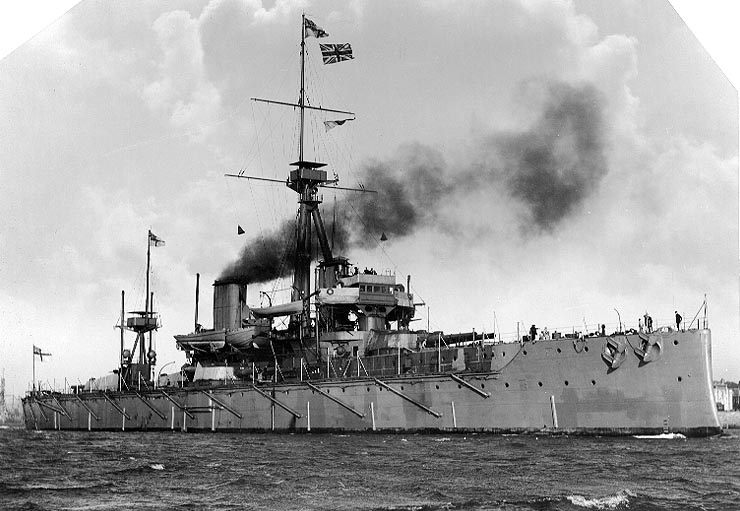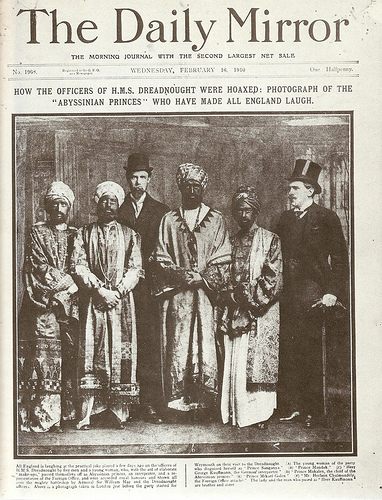When Virginia Woolf Dressed Up as an ‘African’ Prince to Fool the Royal Navy
The irony of a racist prank that sought to show up the British Empire.

Even a person rushing for a tight connection at Paddington Station, London, might have stopped to stare at a strange group making its way onto the train to Weymouth on February 7, 1910. Four people, men of foreign extraction, by all appearances, with luxuriant beards, patterned turbans, gold chains, and extravagant brocade robes, were shepherded through the station by two Brits in suits—interpreters, apparently. One of them, six-foot-five in socks, wore a bowler hat and a great coat. Later, he said that he was dressed “like a seedy commercial traveller.”
But all was not as it appeared. The foreign delegation wore blackface (no less racist for being a common theatrical practice at the time), their beards likely concealing grins. This crew was then young nobodies, but they went on to be some of the most famous artists and thinkers of their time—Virginia Woolf, her brother Adrian Stephen, and the painter Duncan Grant, all of whom later became members of the influential Bloomsbury Group.

Their ringleader, Horace de Vere Cole, had previously pulled off a similar prank at the University of Cambridge, where he and some friends impersonated the Sultan of Zanzibar and his retinue. This time, however, he was attempting a joke on a far grander scale—tricking the Royal Navy into giving a gang of fake “Abyssinian princes” a special tour of its flagship, HMS Dreadnought—537 feet of advanced naval technology.
Danell Jones, a writer and scholar who has written extensively about the “Dreadnought hoax,” as it has come to be known, describes the period as the height of a naval arms race between Germany and Britain. “Six years earlier, they’d brought out this ship that really had made every other ship obsolete,” she says. “A real statement of sea power and British supremacy.” Having this showpiece battleship at the heart of such a hoax would therefore have been especially humiliating for the Navy—it was, for the pranksters, the perfect target.
(While they might have been attempting to subvert the British Empire’s policies, the colonial, racist attitudes underpinning the pranksters’ methods seem, from a modern perspective, deeply problematic. Woolf, for her part, was unambiguous in her attitude toward people with dark skin, writing contemptuously in her diary when she passed an African man in European clothing on the street—noting the “degradation stamped on him” by the color of his skin.)

February 1910 had been cold and rainy. The foreigners’ guides hurried them out of the drizzle and onto a train headed for Weymouth, a seaside town on the south coast. They avoided the rain to prevent their dark makeup from running down their faces. The beards and costumes were similarly ersatz.
Ahead of their arrival, Cole had sent a telegram to the Navy, alerting them of the plans, from one “Herbert Cholmondeley,” of the Foreign Office—the nonexistent interpreter/guide he played in the prank. In Stephen’s later account, he described the two “guides” hunkering down in the dining car on the train, nervous and excited. “I think I half expected that no notice would be taken of us at all, and we should just have to slink back to London,” he wrote. “But no, there on the platform stood a naval officer in full uniform, and the hoax had begun.”

The Royal Navy literally rolled out the red carpet for this foreign delegation. A barrier was put up to keep bystanders away from the “princes.” The naval bandmaster couldn’t find the music to the Abyssinian National Anthem (because it doesn’t exist), so instead played the anthem of Zanzibar, “Mungu ibariki Afrika.” The princes professed to be delighted, allegedly exclaiming “Bunga bunga!” in amazement or surprise, which they also did when shown electric lights in the ship. In a letter from the time, Cole described how he had called them “jolly savages” to the Navy, and claimed “I didn’t understand much of what they said” to their maritime hosts.
The foreign language they appeared to be speaking was a mixture of ancient and modern tongues, swiftly cobbled together on the train with the help of a teach-yourself-Swahili grammar book. British papers went on to describe them as speaking “fluent Abyssinian”—a language that also does not exist. To those with little exposure to people from Africa, the ruse was apparently rather convincing.
While Edwardian sensibilities certainly discriminated against black people, this would have been confounded by the supposedly high status of these fake foreign visitors, says Jones. In this complicated situation, “a lot of [Edwardians] reverted to respecting royalty.”
By the time they were led onto the ship, Stephen remembered, “it was hardly a question any longer of a hoax. We were almost acting the truth.” Everyone was quite convinced that they were being visited by “the emperor and his suite … and it would have been extremely difficult not to.” After a 45-minute tour, and an attempt to pin a fake medal on the breast of a young guard, the troop returned home. They had a photograph taken, and, though proud of themselves for hoodwinking the Navy, thought that would be the end of the jape.

But word got out. It might have been Cole himself who leaked the prank, though he never confirmed that. Either way, shortly afterwards, the Daily Mirror published the story of the hoax, along with the photograph. The Navy was deeply humiliated, and called for the arrest of the perpetrators.
While the hoax was, in essence, a joke, there was an element of pacifist protest to it, wrote the late Alex Zwerdling, who described it as Woolf’s “first public expression” of her lifelong contempt for war. (Woolf and Stephen’s family was always overtly pacifist, and her father Leslie Stephen forbade his sons from joining the military.) Her biographer, Quentin Bell, went further still. This event, he said, “reinforced political sentiments which had for some time been taking shape in her mind.”

There were dark murmurings of imprisonment awaiting the group, amid vague allegations that what they had done constituted fraud, but nothing came of it. The press, too, were divided, writes the Irish poet Robert Greacen. “Some journalists were outraged, others amused.” The Daily Express and the Globe both proclaimed the hoax “amazing” in their headlines. The Mirror declared the hoaxers “The ‘Abyssinian Princes’ Who Have Made All England Laugh,” and published a sardonic comic professing concern about what this might mean for future foreign delegations. Meanwhile, the Penny Illustrated Paper seemed sure that the troop would soon be soundly punished: “The case is too grave to be passed over by the authorities,” it declared, on February 19, 1910.
But punishment, when it came, was rather unofficial and bizarre. Two naval officers appeared at Cole’s home and said they had come “to avenge the honor of the Navy,” according to Stephen’s 1936 account. They had planned to beat him with a stick, but were scuppered by the fact that he was unwell at the time. “Eventually, Cole made a proposal: he would agree to be beaten if he was allowed to reply in kind,” Stephen wrote. So followed a peculiar exchange. On a quiet back street where they would not be interrupted, “six ceremonial taps were administered to Cole’s hindquarters, and six ceremonial taps were administered by him, in return.”
For the Navy, the whole affair was a source of deep embarrassment. “Bunga bunga” became a national catchphrase, and three months of hooting copy appeared in newspapers around the world. “The real threat was to the Navy’s image,” says Jones. “Showing their vulnerability to be hoaxed, in this really silly way—they feared it was going to tarnish their reputation that they were really going to great lengths to create.”

Curiously, the coverage, and much of the ensuing scholarship on the hoax, seems to gloss over its obviously racist aspects. Blackface was not uncommon in theater at that time, but much about the way the pranksters behaved is deeply troubling to modern sensibilities. Tony Thorne, editor of the Dictionary of Contemporary Slang, described “bunga bunga” as having “crude and infantile” sound, like an “Africanism—some kind of colonial imagined tribal ritual of sexual abandon,” he told the BBC. “It has a racist, imperialist quality to it—like a phoney African word, like ‘wonga.’” The term resurfaced more recently to describe then–Prime Minister of Italy Silvio Berlusconi’s sexually charged parties.
Woolf, the only woman in the party, was 28 and unmarried at the time. After the incident she was mistaken for a hired prostitute by the press that covered the incident. She soon grew tired of the attention, and considered the entire episode “dull.” But years later she drew on it for inspiration—first in the 1921 story A Society, then in a 1940 talk, where she stretched the truth on some details and omitted others. This talk recast the story not as a high-stakes stunt, but active political protest in which cheekiness and racist exoticism pulled the curtain back on the pageantry and pomp of war.

















Follow us on Twitter to get the latest on the world's hidden wonders.
Like us on Facebook to get the latest on the world's hidden wonders.
Follow us on Twitter Like us on Facebook